2019 was another difficult year for Myanmar internationally, with the aftermath of the Rohingya crisis continuing to make headlines, climaxing with Daw Aung San Suu Kyi’s defense of the country against a genocide lawsuit at the International Court of Justice. At home, the peace process foundered as the military battled ethnic armed groups in the west and northeast, while the ruling National League for Democracy fought the military in Parliament over charter change. A besieged Tatmadaw pushed back, locking up a string of its most vocal critics, while the government launched legal action against Buddhist nationalists. The government continued to bet on Chinese investment to revive the economy, formally partnering with Beijing on its Belt and Road projects in Myanmar. The shocking rape of a 2-year-old at a nursery school in the capital engrossed the nation and revived concerns about the justice system. But there were positive stories as well, as Myanmar unified around the exploits of its star MMA fighter and cheered on the efforts of a rising badminton star. Meanwhile the country’s young entrepreneurs, artists—and even a champion bartender—made waves in the region and beyond.

Daw Aung San Suu Kyi — A New Role as Defender of the Nation
Until The Gambia filed a lawsuit at the International Court of Justice in November accusing Myanmar of genocide against the Rohingya, Myanmar State Counselor Daw Aung San Suu Kyi was preoccupied with domestic chaos on nearly all fronts. Her party has little to show for its attempt to amend the Constitution. The economy is stagnant. Peace remains a distant dream as the Myanmar military (or Tatmadaw) continues to battle ethnic armed groups.
But when Myanmar was summoned to appear before the court in December, she surprised many with her decision to travel to The Hague and “defend the country’s interest” in person. As a jittery Tatmadaw—which would bear most of the responsibility for any crimes found to have occurred—promised to cooperate with the government, she calmly entered the Great Hall of Justice and took the podium to announce firmly that no genocide was committed in Myanmar and that those involved in war crimes would be tried by local military courts. “Only if domestic accountability fails, may international justice come into play,” she said. The international media were unimpressed, branding her an apologist for military brutality.
Locally, the trial attracted huge public attention. He show of accountability in The Hague convinced a majority of Myanmar citizens—ashamed that their country had been brought before an international court—that they did the right thing by electing her in 2015. Her popularity at home has soared again—a blessing for her party ahead of next year’s election. For all the praise and criticism, however, Daw Aung San Suu Kyi is unlikely to view her testimony as remarkable. As someone who wants her epitaph to read, “She did her duty,” the popular Myanmar leader may simply believe she was doing just that.
By Kyaw Phyo Tha
**********************
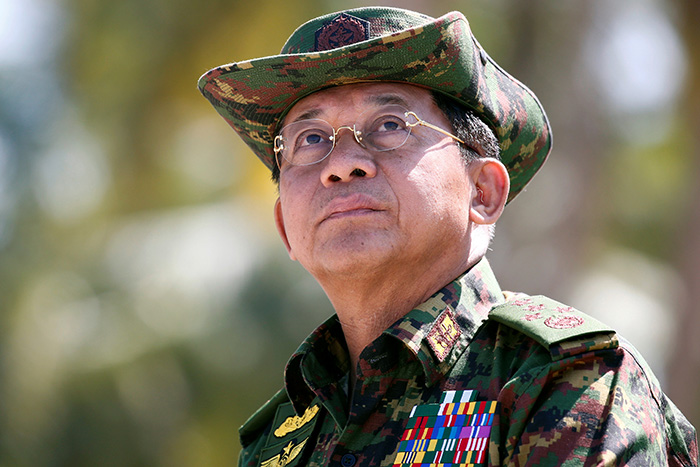
Senior General Min Aung Hlaing—In the Hot Seat
For Myanmar military chief Senior General Min Aung Hlaing, 2019 seems to have been a hapless year. International calls for his and his subordinates’ prosecution at the International Criminal Court and elsewhere over the persecution of Rohingya Muslims intensified. When his civilian counterpart Daw Aung San Suu Kyi personally acted as the country’s agent before the International Court of Justice and testified in the Rohingya genocide case, he had every right to worry that she would single him out for blame for his troops’ alleged atrocities. Thankfully, from his perspective, that didn’t happen.
Closer to home, this year saw some unusual moves by the military chief. Doubtless daunted by the mounting calls for international prosecution over the Rohingya, he made donations at mosques, churches and Hindu temples, portraying himself as an army boss friendly to all faiths, in contrast to the Buddhist chauvinist his is viewed as being by the West. Nationwide pro-military campaigns against the Rohingya were called off. A hastily convened court martial to investigate his soldiers’ misconduct is under way. On the military front, his troops have reportedly suffered significant casualties fighting against the Arakan Army, an ethnic Rakhine armed group, in the country’s west since early this year, and no ceasefire with other ethnic armed insurgents is in sight. Politically, there is speculation that he is eying a bid for the post of Union President in the near future. Interestingly, the military hasn’t totally rejected this idea. If it is true, how these political ambitions play out will be the dominant drama in Myanmar in the coming months.
By Kyaw Phyo Tha
**********************
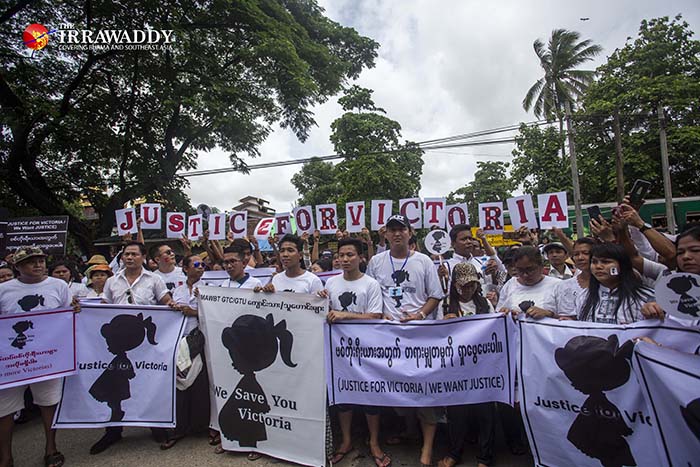
‘Victoria’—Justice Proves Elusive for the Most Innocent of Victims
Victoria is not her name. It’s the name that a social media campaign gave to a 2-year old girl who was sexually abused at a nursery school in the administrative capital, Naypyitaw. The campaign was launched to seek justice for the girl, who is now 3, and to promote public awareness of child rape in Myanmar. The case prompted public rallies in big cities, calling for justice for the girl. At the same time, the many irregularities and complications that have arisen during the prosecution of the case—from police accusations that a man working as a driver for the school’s supervisor was the culprit, to the disappearance of CCTV footage captured at the time of the crime, and threats and lawsuits made against the lawyers and family of the victim by the school supervisor and others—have kept it in the headlines throughout the year.
Making matters worse, according to the victim’s testimony, the offenders were the two teenage sons of the school supervisor, whose husband is a police officer. Last week, the court released the accused driver and dropped the case against him, saying there was insufficient evidence to proceed. To the public’s fury, the real offender is still at large. The public also criticized the way police handled the case, including the revelation of the victim’s identity, and called for legal action against those responsible. Victoria has been showered with nationwide sympathy and support, but justice remains elusive for her. The government has said the case is on its radar. Don’t let the girl down; justice must be done for Victoria.
By Zarni Mann
**********************
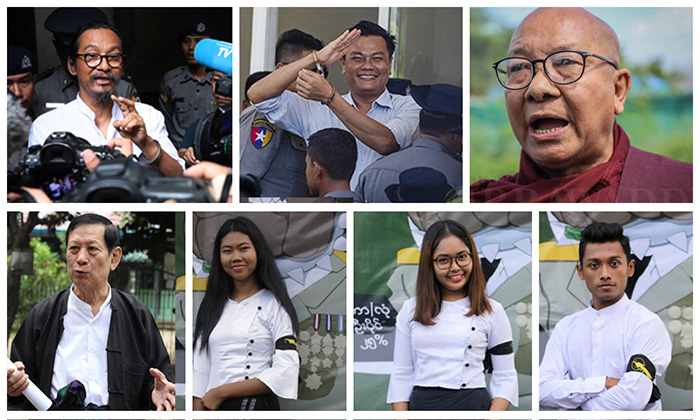
Critics of the Military—Bowed but Not Broken
Amid growing political pressure to amend the 2008 Constitution, Myanmar’s military has become increasingly intolerant of those who voice opinions critical of the institution or the charter it created. Vocal opponents of the undemocratic Constitution, of the military’s involvement in politics, or of its leadership are being targeted with lawsuits, and many found themselves behind bars this year.
Among those targeted was 75-year-old veteran lawyer U Kyee Myint, an outspoken critic of the military who has long advocated constitutional reform. He is currently facing possible detention, along with poet Ko Saw Wai, and rights activist and former military captain U Nay Myo Zin, in Tanintharyi Region’s Kawthaung Prison over speeches the three made criticizing the Constitution. They were sued under the non-bailable Article 505(a) of the Penal Code. U Nay Myo Zin is already serving a one-year prison sentence for speaking out against the military leadership and faces two more trials in Irrawaddy and Sagaing regions under the same charges.
Also facing the military’s ire is the Peacock Generation Thangyat troupe. Its members face no less than eight lawsuits filed by military officers in townships both in and outside of Yangon for mocking the army in their satirical performances. So far, they have each been sentenced to a total of two years and six months in prison for three cases. The trials in the remaining cases are ongoing.
Ailing prominent filmmaker and human-rights activist Min Htin Ko Ko Gyi has been imprisoned since April for a series of Facebook posts criticizing the political role granted to the military by the Constitution. Not even the Buddhist clergy has been spared; two monks in Mandalay have been sued under defamation laws for criticizing the army.
However, neither imprisonment nor the threat of it has been particularly effective in deterring critics of the military. Those listed above have refused to remain silent, continuing to criticize the army and serving as examples for others who would fight the injustices of the military and push to amend the Constitution drafted by the ex-military regime.
By San Yamin Aung
****************
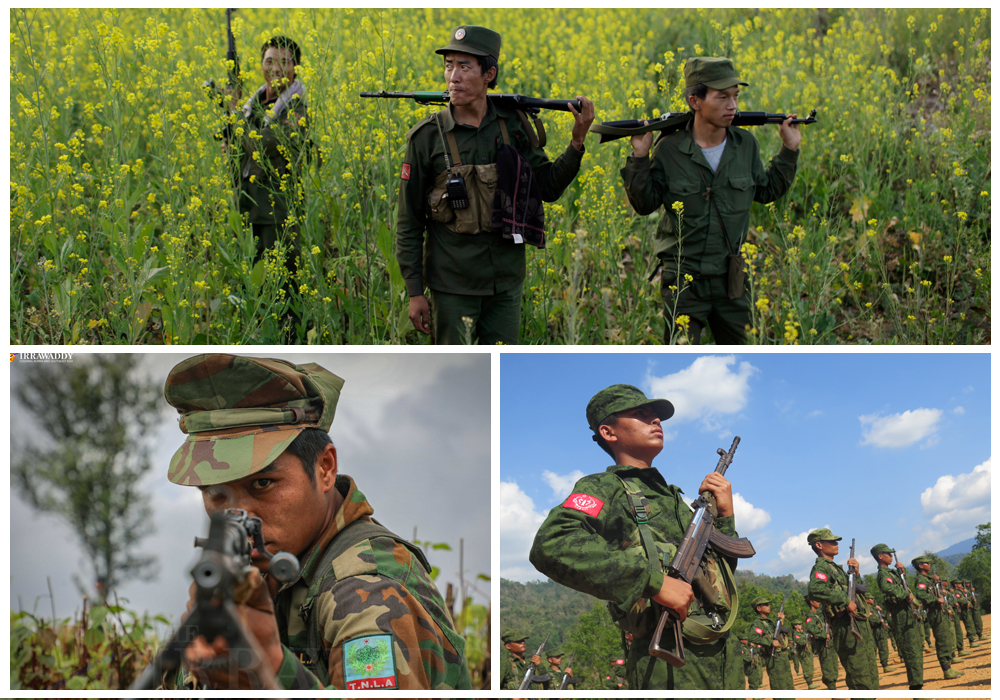
The Brotherhood Alliance — Waging War in the West, Northeast
The Myanmar peace process suffered another serious disruption this year as the Ta’ang National Liberation Army (TNLA), Arakan Army (AA) and the Myanmar National Democratic Alliance Army (MNDAA) engaged in deadly conflicts with the Myanmar Army in the country’s northeast and west.
Of the three, the AA has been the most active. It started the year by launching coordinated attacks on police outposts in northern Rakhine, and the area has been a battleground ever since, resulting in hundreds of civilian deaths and the displacement of nearly 100,000 people as of Dec. 14, according to the Rakhine Ethnic Congress. Both sides arrested civilians throughout the year—including an NLD lawmaker, who is being held by the AA—on suspicion of spying. The government arrested family members of the AA chief, and some people affiliated with the AA. In the latest incident, the wife and two children of the armed group’s leader were detained by Thai police at the request of Myanmar authorities.
In solidarity with the AA, its allies the TNLA and MNDAA launched attacks on the military’s technological academy in Mandalay Region’s Pyin Oo Lwin and on police checkpoints in Naungcho, Shan State in August. The groups, known collectively as the Brotherhood Alliance, threatened further attacks in major cities, and said they had been forced to fight in order to counter atrocities by the Myanmar military in their areas.
At the urging of China, the alliance members joined informal peace talks with the government at least six times this year, most recently on Dec. 14 in China’s Yunnan province. However, the discussions have yielded little fruit and mostly ended in finger-pointing, leaving Myanmar’s peace process stalled.
By Nyein Nyein
************************
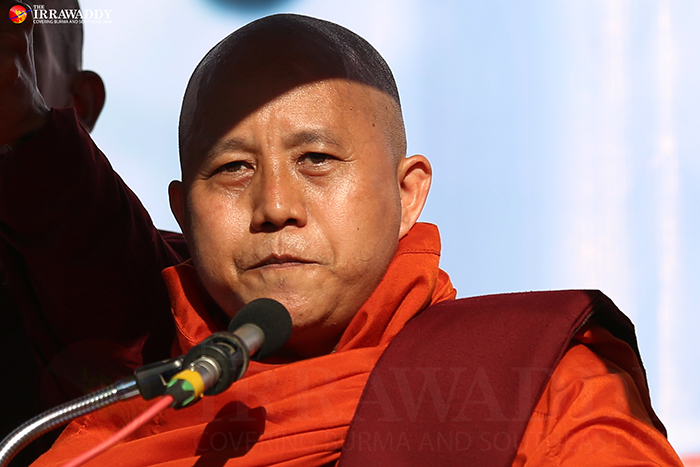
U Wirathu—From Firebrand to Fugitive
Of all the actions taken by the National League for Democracy government this year, one of the most welcome was its decision to issue an arrest warrant for Myanmar’s ultranationalist monk U Wirathu on a sedition charge for his attempts to incite disaffection with the government in June. Since then, he has been on the run. Known for his fiery sermons against Muslims, the monk had been at the forefront of the Buddhist nationalist movement in the country since 2012. Significantly, the government’s move has kept him silent since the warrant was issued. Another major blow to the nationalists’ cause was dealt by the Myanmar military chief—whom they revere as the guardian of race and religion—when he made rare donations to mosques, churches and Hindu temples in response to mounting international calls for senior military officers to be prosecuted over the Rohinyga issue. U Wirathu once said that if Myanmar’s military leadership was charged at an international court for alleged atrocities against the Rohingya, he would take up arms. Currently, that seems a mission impossible for him, as the monk is currently too busy saving his own skin to worry about protecting others.
By Kyaw Phyo Tha
************************
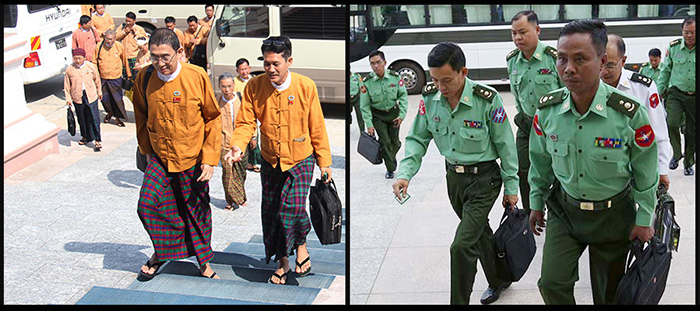
Parliament’s Charter Amendment Committee—Elected Lawmakers vs. Military Appointees
Since the National League for Democracy initiated its attempt to democratize the military-drafted Constitution with the formation of the Charter Amendment Committee in late January, many people have shown support for it. But it also has its opponents. And not surprisingly, the main and fiercest opposition has come from the unelected military lawmakers.
In recent months, there has been no shortage of confrontations between lawmakers supportive of the committee and the military MPs, who reject the committee and its recommendations, which include removing the military from Parliament.
The military—for which the Constitution reserves 25 percent of parliamentary seats—has consistently resisted the committee’s work as “unconstitutional”, despite the fact that it was formed according to the same procedures as an earlier charter-amendment committee under the previous government, led by the military-backed Union Solidarity and Development Party (USDP). The earlier committee’s work did not lead to any significant changes in the charter.
In parallel with the work of the Charter Amendment Committee, which is currently drafting a constitutional amendment bill after reviewing the entire charter and compiling amendment proposals from various parties, the military has submitted two constitutional amendment bills of its own, and three jointly with the USDP. Despite facing continuing strong resistance and warnings from the military, the committee has vowed to finish drafting the bill and submit it to Parliament early next year.
By San Yamin Aung
****************************
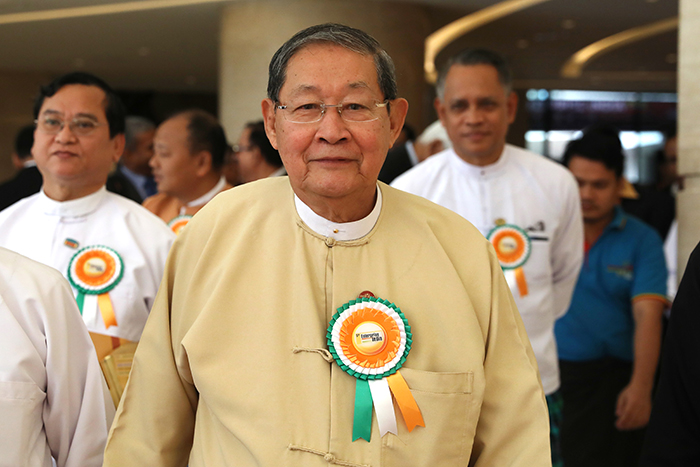
U Soe Win — Economic Reform, China Projects Keep Veteran Minister Busy
Minister of Planning and Finance U Soe Win is not only the oldest minister in the National League for Democracy (NLD)-led government—he is also its busiest, as he is currently overseeing the merger of two key economic ministries. He has been serving concurrently as the industry minister since July, when his predecessor in that portfolio resigned due to performance problems.
The 80-year-old, who has more than three decades of experience in international banking, is also the chairman of the agency responsible for coordinating the implementation of the China-Myanmar Economic Corridor (CMEC)—part of Beijing’s vast international infrastructure plan—making him the point man on negotiations with China on proposed projects and related policy matters.
When U Soe Win signed the CMEC agreement with China last year, many experts raised concerns that Myanmar would be led into a debt trap with its giant neighbor. In May, the Ministry of Planning and Finance unveiled three demands that the minister submitted to China in order to avoid such a trap: that Myanmar be allowed to seek financing from international financial institutions to implement the projects; that the government be allowed to invite international tenders, so as to ensure international investment in the projects; and that the proposed projects must be chosen by Myanmar while creating mutual benefits for both sides.
In another development this year—recognized as a flagship reform of the NLD government—the insurance sector was liberalized, with the ministry granting permission to fully foreign-owned companies to operate businesses offering life and non-life insurance in Myanmar.
By Nan Lwin
**********************
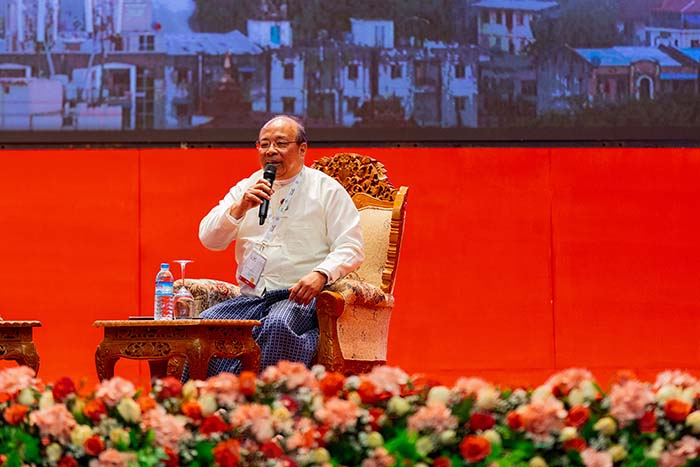
U Thaung Tun — Beating the Drum for Foreign Investment
Placed in the driving seat at the Ministry of Investment and Foreign Economic Relations by Daw Aung San Suu Kyi, U Thaung Tun has been tasked with turning around the decline in foreign investment in order to halt Myanmar’s economic slowdown. This daunting task has been made even harder now that the country’s international image is in ruins due to the Rakhine crisis.
As the National League for Democracy (NLD)-led government’s investment tsar, the ex-national security adviser has toured Asia and Europe, beating the drum for his country’s economy and striving to reassure foreign investors that Myanmar is becoming a more favorable, friendly and predictable investment environment and promising them a fair and level playing field.
Organizing investment forums across the country, he has sought to soften investors’ sentiment toward Rakhine State, saying, “Instead of blaming and shaming, let’s work together”, and stressing the need for foreign investors to work with the Myanmar government to create sustainable development in the state.
The Myanmar government announced in August that approved FDI into the country for April-September stood at US$4.1 billion, a nearly 70-percent increase over the same period in 2018. Myanmar also climbed six places to 165th in the World Bank’s 2020 ease of doing business ranking. The gain was attributed to the creation of an easier environment in which to start a business, and the implementation of greater protections for minority investors, among other improvements.
By Nan Lwin
************************

Na Gyi — the Bright Future of Myanmar Cinema
Myanmar’s film Industry is at a promising stage, thanks to the emergence of a new crop of young local directors in recent years. Among them, Na Gyi has been recognized for his debut film “Mi”, which became a blockbuster in the country over the past year after premiering in late 2018.
Na Gyi started his directing career as an indie filmmaker working in documentaries, short films and music videos, and this year earned regional recognition with his first full-length film, winning the Best Director of Photography award at the ASEAN International Film Festival and Awards 2019, held in Kuching, Malaysia in April. Na Gyi is the first director from Myanmar to win the honor.
“Mi”, named after its main character, is a movie adaptation of a famous novel by prominent Myanmar author Kyi Aye. The film, which portrays the life of an independent, trendy woman from Myanmar society in the 1940s, was the first local movie to create a full period set and use thoroughly researched costumes and make-up to reflect the styles that were in fashion during that period.
Na Gyi has earned the admiration of local movie lovers for his directorial skill, careful preparation, cinematography and meticulous attention to detail. “Mi” was also screened at ASEAN Cinema Week 2019 in Busan, South Korea in November. Na Gyi is currently working on his second film.
By Lwin Mar Htun
********************
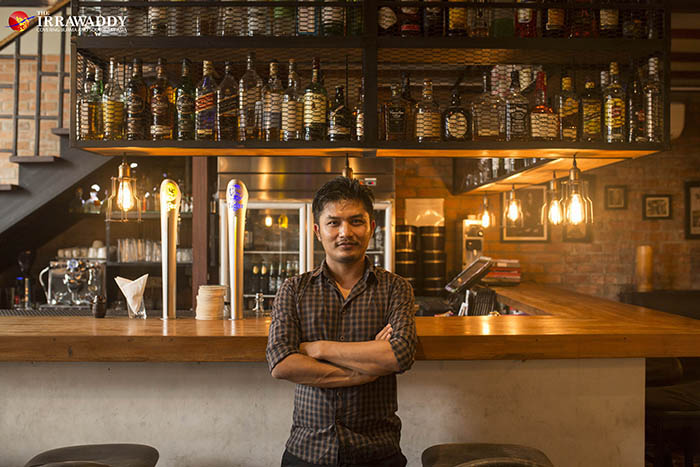
Lal Muan Puia — Mixing It Up for Myanmar
The bar culture in Myanmar is still in its infancy, and some locals still look down on bartenders, not realizing the degree to which this occupation has become professionalized. But mixologist Lal Muan Puia from Gekko Yangon hasn’t let that slow him down, recently earning the chance to represent Asia Pacific in a global cocktail competition, the Bacardi Legacy Cocktail Competition Wildcard.
Lal Muan Puia, the first mixologist from Myanmar to earn the honor, will head to Puerto Rico this coming January. He will also travel to Milan in January to compete in the Campari Bartender Competition Asia 2019 as a representative of Myanmar. Early this year he was named Wine and Spirit Ambassador of the Year at the 2019 Myanmore Awards.
Ko Puia specializes in gin and whiskey-based drinks and is famous for using the best seasonal ingredients. The energetic and upbeat mixologist went to Abu Dhabi in the United Arab Emirates with zero experience to work as a bar assistant in 2010. Ten years later, he has established himself as one of the most popular and accomplished local mixologists in Myanmar.
By Lwin Mar Htun
*****************
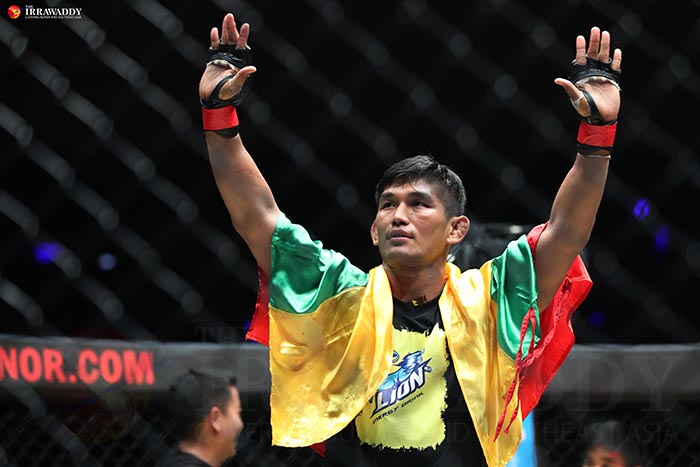
Aung La Nsang, ‘The Burmese Python’
While there is much that divides Myanmar people at present, there is at least one person whom everyone in the country indisputably supports and feels proud of.
Thanks to his series of victories in MMA (mixed martial arts) since 2016, Aung La Nsang has become Myanmar’s pride and joy. The Kachin fighter retained his ONE Championship title this year by defeating challenger Brandon Vera in Tokyo on October.
Popularly known as “The Burmese Python”, the Myanmar-born mixed martial artist, who has settled in the US state of Florida, is hugely popular in Myanmar due to his ONE middleweight and light heavyweight championships. His latest match sparked such excitement among spectators in Myanmar that four people died while watching the event live on TV, mostly due to heart attacks.
Aung La Nsang is known for his admiration of State Counselor Daw Aung San Suu Kyi. At their first meeting in 2017, he gave her a pair of his gloves as a present. This year in Tokyo, shortly after his October success, she took time out during an official visit to the Japanese capital to personally congratulate him.
In 2018, the Kachin fighter’s international achievements also elicited a personal congratulations from the country’s military chief, Senior-General Min Aung Hlaing, who awarded the fighter a cash prize and issued an official statement declaring him to embody the indomitable spirit of Myanmar, and to be the pride of the nation.
By Zaw Zaw Htwe
************************

Thet Htar Thuzar — Badminton Player Inspires a Nation
In football-mad Myanmar, badminton rarely makes headlines. But that changed in 2019 when a young Myanmar woman’s self-funded struggle to compete in—and win—overseas badminton tournaments became a major news story.
Thet Htar Thuzar, age 20, first won the hearts of Myanmar fans after winning her first gold medal in Egypt in October 2018. Since then, she has taken her tally of international badminton titles to seven. Of the 92 games she has played, she lost only 20. Most recently she represented her country at the Southeast Asia Games in the Philippines, which ended on Dec. 10.
Her popularity rose in the wake of media reports that her appearances at international badminton tournaments at that time were entirely self-supported, without any assistance from the Ministry of Health and Sport or other government agencies.
Thet Htar Thuzar spent her early years in Thailand with her parents, who are former badminton champions. She won several prizes at tournaments there, including an award from the Thai king, before she returning to Myanmar at age 11.
Her tireless efforts eventually helped her to gain public recognition, and financial contributions from individuals and companies as well as the Myanmar military. Currently placed at No. 62 in the Badminton World Federation’s world rankings, her immediate goal is to collect enough points at international badminton tournaments to qualify for the 2020 Olympic Games in Tokyo.
By Zaw Zaw Htwe
************************

Organic Food Entrepreneurs—A Niche for Myanmar’s Farmers
Amid rising concerns about food safety and the growing popularity of organic products, Myanmar’s homegrown chemical-free coffee, tea, eggs and vegetables are taking a front seat in the food market as health-conscious consumers become increasingly choosy about what they eat. Apart from their growing local popularity, some of them, mostly run by native young entrepreneurs, also gained international attention this year.
In September, Ko Zaw Ye Naung of the Shwe Taung Nyo Gyi poultry farm was recognized as a 2019 UN Global Compact Sustainable Development Goals (SDG) Pioneer for advancing local livelihoods through his farms, which use a micro-farming business model to support farmers and produce chickens and free-range eggs. One month later, renowned local brand Genius Coffee founded by Ko Ngwe Tun was recognized with the ASEAN Business Award for Sustainable Social Enterprise for its innovative, significant and sustained contributions to local communities in Southern Shan and Kayah states.
Locally, Paline fermented tea leaves are known for their organic growing and processing methods. But producer Ko Myo Win Aung wasn’t satisfied with local success, and this year took his products to a major trade show in China for a second consecutive year. In November, Paline was exhibited at the Myanmar Pavilion along with Genius Coffee and two other tea producers at the Second China International Import Expo in Shanghai, gaining exposure to expo-goers from 150 countries.
And if you’re looking for chemical-free fruit and vegetables in Yangon, go to Ma Kye Mon Lwin’s Organic Valley. The farm is known not only for its more than 50 types of produce, but also for promoting a clean and sustainable environment through its eco-friendly packaging, as well as for creating jobs for women in the community.
By Nyein Nyein
************************
You may also like these story:
The Most Popular Stories of 2019

















